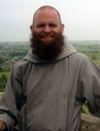I recently saw The
Hobbit: An Unexpected Journey, the first of a trilogy of movies based upon
J.R.R. Tolkien’s marvelous prelude to his Lord
of the Rings Trilogy. I found myself
deeply moved and inspired by the movie, especially the character of Bilbo
Baggins and his reluctant struggle to accept an invitation to step out of his
comfort zone and make an “unexpected journey”.
While not an immoral hobbit, Bilbo was living a very comfortable, “I’m
ok, you’re ok, leave me alone” lifestyle.
He was minding his own business, eating (several meals a day), sleeping,
smoking his pipe, reading his books and maps, and seems perfectly content to
live for the next meal, nap or smoke. However,
the good wizard Gandalf showed up at his front door and disrupted all of that,
inviting Bilbo on a journey of epic proportions, and not taking “no” for an
answer! Before they set out, Bilbo asked
if Gandalf could guarantee his safe return.
Gandalf said that he could not, but then assured Bilbo that if he did
return, he would not be the same person that he was when he started. It was as if to say, if he made this journey,
Bilbo would become the person he was created to be. What Bilbo gradually began to realize was
that before he chose the journey, the journey had already chosen him—he was
made to do this.
Brothers, I
find Bilbo’s struggle to accept Gandalf’s invitation so moving because it
speaks to both the struggle of vocational discernment and the on-going struggle
of discipleship. Vocational discernment
can indeed be a journey, sometimes a reluctant and grueling one, as we seek to
distinguish between the voice of God, our own voice, and the voice of the enemy
(the world, the flesh, and the devil).
That’s why we feel a sense of victory and peace when we are able to surrender
and say “yes” to what God is asking of us.
However, the journey is not over at that point! Really, it is just beginning. Vocation discernment is about saying “yes” to
the journey of discipleship, but the living out of our vocations is about
actually making that journey. And we
quickly realize, as Bilbo and his companions did, that it is an “unexpected
journey”, and that the fulfillment of our “yes” is full of peaks and valleys,
joys and sorrows, darkness and light, defeat and victory. And through it all the Lord is molding us
into our true selves.
We witness
a similar dynamic in the life of the Blessed Virgin Mary. At first, the visit of the Angel Gabriel
deeply troubled her. She didn’t fully understand his greeting (what did
it mean that she was “full of grace”?) or the invitation being extended to
her: “How can this be, since I have no
relations with a man?” But the angel
Gabriel assured her that “nothing will be impossible for God” and that she was
not to rely upon her own power, but that of the Holy Spirit. He helped her to realize that she was being
asked to say “yes” to a journey that had already said “yes” to her. It wasn’t a journey she fully grasped; she
accepted it amidst the darkness of faith not completely knowing what would be
demanded of her. While she experienced
truly unfathomable joy as a result of her “yes”, she also experienced untold
sorrow as well. And yet, ultimately, her
“yes” changed history, bringing salvation to those of us who accept it.
Blessed
John Paul II proclaimed that “Mary teaches Christians to live their faith as a
demanding and engaging journey,
which, in every age and situation in life, requires courage and constant
perseverance.” And so, we look to her this
Advent and Christmas not only for the grace to say “yes” to the journey of
discipleship, but for the courage and perseverance to live that “yes” through
every “unexpected” twist and turn. If we
do so, our unexpected journey will lead us to unexpected joy!
Merry Christmas to you all!
Fr. Isaac Mary Spinharney, CFR
St. Joseph Friary
Harlem, NY






